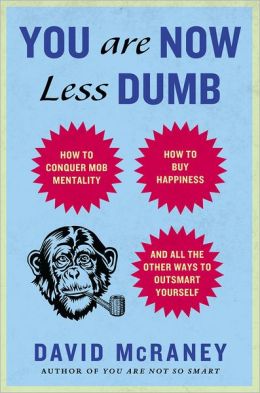
Like the first book, the introduction and each chapter in this book begins with a theme, stated as a ‘misconception’ and a ‘truth’. Here are those from the introduction:
Misconception: You are a being of logic and reason.
Truth: You are a being capable of logic and reason who falls short of that ideal in predictable ways.
The introduction describes a contested football game between Dartmouth and Princeton in which fans of each school, watching an identical pre-recorded video of a key game, had vastly different reactions about which side was unfairly rough. We are all ‘naive realists’, McRaney says; we think what we see is what actually happens, but this is a philosophical idea long discredited by science. Eye-witness testimony is basically worthless [an idea that is, gradually, creeping into public policy].
This book, more than the first one, has deeply affected and channeled my thinking. It consolidates ideas I’ve been pondering for some time, and given them a framework for further thought.
The first, anchoring, chapter, is about ‘narrative bias’.
Misc: You make sense of life through rational contemplation.
Truth: You make sense of life through narrative.
A key psychological experiment recounted here is about three mental patients, each of whom believed he was the reincarnation of Jesus Christ. When confronted with each other, brought together in the same mental institution — what happened? (This experiment took place decades ago and would be regarded as unethical now.) Each one explained the others away, without abandoning their own personal narrative. Each one clang to his personal narrative.
Every culture finds ‘meaning’ in the world through narrative. These are the basic narratives that Joseph Campbell identified — the character who faces adversity, embarks on an adventure, and succeeds against great odds. Or–does not succeed; the tragedy. Both narratives appeal because anyone can map their own experiences onto one of these two templates.
The brain/mind [they are the same] tries to make sense of any experience by trying to detect causes. A revealing case is how Air Force pilots, subject to such high G forces that they black out, have experiences very similar to the so-called ‘near-death’ experiences: the tunnel, the white light, friends and family, memories. Even as it’s dying, the brain keeps trying the make sense of things, in a narrative fashion.
All humans reduce life to two questions: where did we come from, and why are we here?
Narrative psychology asks, why are these questions so important? It seems that *meaning*, to these questions, is more important than ordinary happiness. And meaning requires narratives.
McRaney touches on the ‘concept of mind’ notion that I’ve read about in Daniel Dennett and Jesse Bering. It’s the idea that babies, until they are two or three years old, don’t realize that other people have minds of their own. The naive notion is that other objects — the sun, the moon, the winds and the rains — also have ‘minds’, a notion that has given rise to many mythologies — or religions [they are the same? ;)]. McRaney remarks,
Out of that sense of self and other selves come the narratives that have kept whole societies together. The great mythologies of the ancients and moderns are stories made up to make sense of things on a grand scale. So strong is the narrative bias that people live and die for such stories and devote whole lives to them (as well as take lives for them).
Here is where I perceive McRaney taking a very diplomatic stance. He does not mention the word ‘religion’, or ‘faith’, even though this is obviously what he is talking about — but to make this explicit would make this a very different kind of book. One that might alienate many a reader. I think this is a wise decision, because as long as he does not alienate these readers, he can make them think about these biases. Making them think.
Enough for now. More in a later post.





